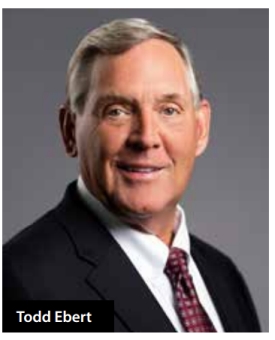 Todd Ebert’s a believer. “I am a huge believer and advocate of the [group purchasing industry] and what it does.” But he doesn’t take it on faith. Ebert has been in group purchasing for 25 years, beginning in 1990 at Intermountain Healthcare, where he was manager of the Amerinet’s ValuPharm pharmacy program in the western United States. Two years later, he moved to St. Louis to join the Amerinet team there, ultimately becoming president and CEO of Amerinet in 2007. Most recently, in July 2015, Ebert was named president and CEO of the Healthcare Supply Chain Association, the association for group purchasing organizations, replacing outgoing president Curtis Rooney.
Todd Ebert’s a believer. “I am a huge believer and advocate of the [group purchasing industry] and what it does.” But he doesn’t take it on faith. Ebert has been in group purchasing for 25 years, beginning in 1990 at Intermountain Healthcare, where he was manager of the Amerinet’s ValuPharm pharmacy program in the western United States. Two years later, he moved to St. Louis to join the Amerinet team there, ultimately becoming president and CEO of Amerinet in 2007. Most recently, in July 2015, Ebert was named president and CEO of the Healthcare Supply Chain Association, the association for group purchasing organizations, replacing outgoing president Curtis Rooney.
“I’ve seen the value of group purchasing, so when the opportunity [to lead HSCA] arose, it was absolutely, ‘Let’s work it out,’” he says. “I understand and enjoy the policy side, and honestly, I know I can make a difference.”
Group purchasing organizations are part of healthcare’s fast-paced and dynamic industry, says Ebert. In such an environment, GPOs need to pay close attention to their members, and provide them the products, services and solutions they need to be successful. “We have to pay attention to our customers. There’s nothing that says they have to stay with you. If they don’t believe you have value, they can –and will – look elsewhere.”
HSCA members can take a position as leaders in providing high-quality healthcare supply chain solutions, he says. And they can do so in many ways. For example, in the Northeast, GNYHA Services has worked with member hospitals to standardize medical products and processes in a successful effort to reduce central line infections. In the Pacific Northwest, Virginia Mason Health System recently documented savings of $750,000 through standardization on contract items. “And there are thousands of these success stories among our GPOs,” says Ebert.
Ebert intends to consistently and effectively carry the group purchasing industry story to its healthcare supply chain partners. “There are some things I want people to know,” he says. “Yes, we save people money by aggregating volume and working with customers.”
But GPOs do more than that, namely:
- Support and embrace competition and innovation. “That makes everybody better, and the ultimate benefactor is the patient.
- Embrace transparency in the contracting process. “We have taken great pains to make sure we have outlined our contracting processes, trained our people, so all vendors can say, ‘I got a fair shot.’”
- Improved their internal processes. “Each GPO has a little bit different business model,” says Ebert. “Each has found a niche in which they can be a leader, whether it be revenue cycle, big data, clinical, etc.
“Group purchasing is unique and fun. That’s why I’m here. We’ve seen what we’ve done. I’m a believer.”
